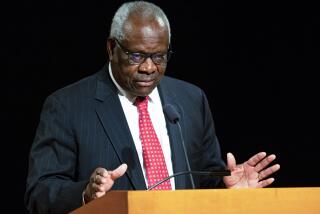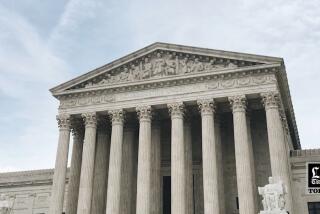Court to Rule on Use of Criminal Proceeds to Pay Lawyer Fees
WASHINGTON — The Supreme Court today agreed to decide whether the government may confiscate from criminal defendants money and property that could be used to pay their legal fees.
The court announced that it will review cases stemming from federal prosecutions of drug dealers in New York and Virginia.
The justices thus set the stage for an important ruling on the rights of the accused and the government’s power to fight crime by seizing illicit criminal proceeds. Their decision is expected in 1989.
In one case, the Washington law firm of Caplin & Drysdale was denied $170,000 in legal fees for representing Christopher Reckmeyer. He pleaded guilty in 1985 in Virginia to charges stemming from what prosecutors said was his role as kingpin of a multimillion-dollar drug operation.
Reckmeyer was sentenced to 17 years in prison and was ordered to forfeit all proceeds from the drug deals. The seizure of the money left him without funds to pay Caplin & Drysdale.
January Ruling
The U.S. 4th Circuit Court of Appeals ruled last January that Reckmeyer is not entitled to use any of the money to reimburse the law firm.
In the second case, the Reagan Administration appealed a ruling that allows Peter Monsanto access to assets worth $400,000 to help him pay his lawyers.
Monsanto was convicted in New York City of charges that he headed a heroin-selling ring.
The jury also ordered him to forfeit to the government a house in Mt. Vernon, N.Y., valued at $335,000, a $30,000 cooperative apartment in the Bronx and $35,000 in cash.
But the U.S. 2nd Circuit Court of Appeals ruled in July that he could use the assets to pay legitimate legal fees incurred in his defense.
‘Legitimate Assets’
At issue are forfeiture provisions of key federal crime-fighting laws, including the Continuing Criminal Enterprise Act and the Racketeer Influenced Corrupt Organizations statute.
The 4th Circuit court ruled in Reckmeyer’s case that the constitutional right of the accused to be represented by a lawyer does not entitle the defendant to an attorney of his choice.
“The right to counsel of choice belongs only to those with legitimate assets,” the appeals court said in a 7-4 decision. “The right to counsel does not guarantee that every defendant will have the lawyer he desires.”
But the 2nd Circuit appeals court, in an 8-4 decision, said Monsanto is entitled to use his assets to pay his lawyer.
The 2nd Circuit ruling produced eight opinions, including three by those in the majority who ruled in Monsanto’s favor.
Sculpture Copyright
In other action today, the court:
--Agreed to decide a recurring copyright question by reviewing a dispute over a sculpture depicting the plight of the homeless commissioned by the Community for Creative Non-Violence.
The court will hear an appeal by the group, which seeks exclusive copyright ownership of the work.
--Refused to reinstate an unusual racial quota system designed to prevent “white flight” from the nation’s largest publicly assisted housing development.
The court let stand a ruling that the racial distribution of apartments at the middle-income Starrett City development in Brooklyn, N.Y., violates the federal Fair Housing Act.
--Rejected an appeal by a company challenging federal guidelines for controlling and removing asbestos in school buildings.
--Rejected a free-press challenge to a judge’s order that barred participants in the criminal trial of former Rep. Mario Biaggi (D-N.Y.) from talking to news reporters.
More to Read
Sign up for Essential California
The most important California stories and recommendations in your inbox every morning.
You may occasionally receive promotional content from the Los Angeles Times.










